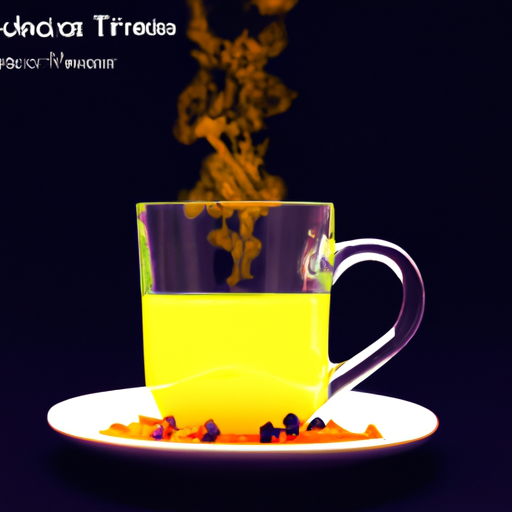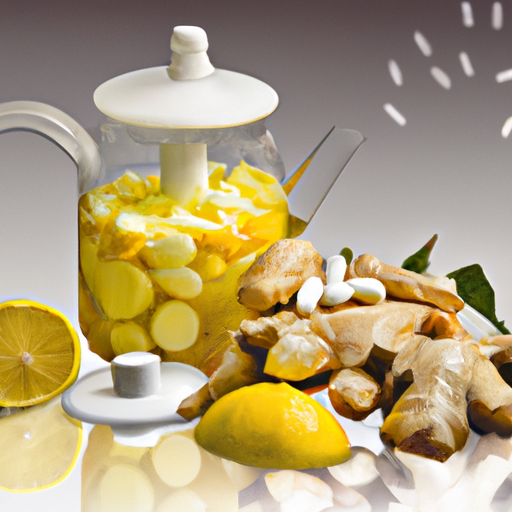I’ve always been a big fan of herbal teas, and ginger and turmeric tea is one of my top choices. Not only does it have a tasty, comforting taste, but it’s also recognized for its various health benefits.
But can you drink ginger and turmeric tea every day? In this article, we’ll explore the potential benefits and risks of daily consumption, as well as some tips for preparing and enjoying this flavorful tea.
Ginger and turmeric are both root spices that have been used for centuries in traditional medicine. Ginger is known for its anti-inflammatory and digestive properties, while turmeric contains a compound called curcumin that may have antioxidant and anti-cancer effects. When brewed together in a tea, these two spices create a flavorful and aromatic beverage that has become increasingly popular in recent years.
But is it safe to drink every day? Let’s find out.
Key Takeaways
- Daily consumption of ginger and turmeric tea can have numerous health benefits, including reducing inflammation, pain, and nausea.
- However, it is important to be cautious with dosage and potential interactions with medications.
- Adding certain ingredients, such as black pepper and lemon, can increase the bioavailability of key nutrients in the tea.
- Choosing organic and fair-trade options can support ethical and sustainable agriculture practices.
Benefits of Ginger and Turmeric Tea
You can reap the health benefits of ginger and turmeric tea by drinking it daily. Ginger and turmeric have been used in traditional medicine for centuries due to their anti-inflammatory and antioxidant properties.
Ginger contains compounds called gingerols and shogaols which help reduce nausea, pain and inflammation. Meanwhile, turmeric contains curcumin which has been shown to have anti-inflammatory and anti-cancer properties.
Apart from their health benefits, ginger and turmeric are also popular culinary ingredients. Ginger is commonly used in Asian cuisine to add flavor to dishes such as stir-fries and soups, while turmeric is often used in Indian curries for its earthy flavor and vibrant yellow color.
By incorporating ginger and turmeric into your daily routine, whether through tea or cooking, you can enjoy their delicious taste while also improving your overall health.
As with any food or drink, it’s important to be aware of potential risks and precautions. In the next section, we’ll explore some things to keep in mind when consuming ginger and turmeric tea.
Risks and Precautions
Be aware of potential risks and take precautions before making ginger and turmeric tea a daily habit. While these herbs are generally considered safe, they can have adverse effects on individuals with pre-existing conditions such as gallbladder problems, kidney stones, and bleeding disorders.
Ginger and turmeric can also interact with certain medications, including blood thinners and diabetes medications, leading to harmful side effects. It’s important to consult with a healthcare provider before regularly consuming ginger and turmeric tea to assess any potential risks and drug interactions.
Additionally, it’s recommended to limit daily consumption to no more than four grams of ginger and one gram of turmeric to avoid adverse effects. With proper precautions and moderation, ginger and turmeric tea can provide numerous health benefits without posing any harm.
Daily Consumption Limits
Limiting how much ginger and turmeric tea you consume per day is crucial to avoid potential side effects. While both ginger and turmeric are generally safe foods, excessive intake can cause nausea, diarrhea, heartburn, and allergic reactions. The recommended intake of ginger and turmeric tea is up to 3 cups per day, but it’s always best to consult with a health professional before adding it to your daily diet.
To enjoy the health benefits of ginger and turmeric tea without any adverse effects, it’s essential to be mindful of the amount you consume. Here are some reasons why limiting your daily intake is important:
- Overconsumption can lead to digestive discomfort and upset stomach.
- Drinking too much ginger and turmeric tea can interfere with blood-thinning medications or increase the risk of bleeding.
- Although rare, excessive consumption of turmeric can cause liver damage.
Now that we know the importance of regulating our intake, let’s explore how to prepare ginger and turmeric tea.
How to Prepare Ginger and Turmeric Tea
To whip up a warm and comforting cup of ginger and turmeric tea, start by bringing a pot of water to a boil. Add sliced ginger and turmeric root, and let simmer for about 10-15 minutes. Strain the tea and serve hot.
If you prefer a stronger flavor, you can increase the amount of ginger and turmeric used. There are several variations of ginger and turmeric tea that you can try to suit your taste preferences.
You can add honey or lemon for a touch of sweetness or acidity, respectively. Some people also like to add black pepper to enhance the absorption of the turmeric’s active ingredient, curcumin. Another option is to use powdered ginger and turmeric instead of fresh roots.
Drinking this tea regularly can provide numerous health benefits, such as reducing inflammation, boosting immunity, and aiding digestion. Moving on to adding other ingredients, you can experiment with different herbs and spices to enhance the flavor and benefits of your ginger and turmeric tea.
Adding Other Ingredients
I love experimenting with different ingredients to add to my ginger and turmeric tea. Some of my favorites include adding a spoonful of honey and a squeeze of lemon for a sweet and tangy flavor.
Another great option is to add a few sprigs of fresh mint and a sprinkle of cinnamon for a refreshing and spicy twist.
Lastly, for a creamier flavor, try adding a splash of milk and a drizzle of honey. These ingredients not only add flavor but also provide additional health benefits.
Honey and Lemon
You’ll love the delicious taste of honey and lemon in your ginger and turmeric tea! Not only do these ingredients enhance the flavor of the tea, but they also offer numerous health benefits.
Here are four reasons why you should add honey and lemon to your ginger and turmeric tea:
- Honey is a natural sweetener that can help soothe a sore throat and reduce coughing.
- Lemon contains vitamin C, which can boost your immune system and help with digestion.
- The combination of honey and lemon can help relieve nausea and indigestion.
- Both honey and lemon have anti-inflammatory properties, which can help reduce inflammation in the body.
Now, if you’re looking for another way to spice up your ginger and turmeric tea, try adding some mint and cinnamon!
Mint and Cinnamon
Who would’ve thought that adding mint and cinnamon to your ginger and turmeric concoction could make it taste so unbelievably good?
Not only does it taste great, but it also provides healthy substitutes for sugar and creamer. Mint is a refreshing herb that adds a cooling sensation and a hint of sweetness to the tea. Cinnamon, on the other hand, is a warm spice that adds depth and complexity to the flavor profile.
Aside from their taste benefits, mint and cinnamon also have health benefits. Mint is known for its ability to soothe the digestive system and relieve nausea. Cinnamon, on the other hand, is known for its anti-inflammatory properties and ability to regulate blood sugar levels.
By incorporating these flavor combinations into your ginger and turmeric tea, you’re not only making it taste better, but you’re also making it healthier.
Moving onto the next section about ‘milk and honey,’ these two ingredients are commonly added to tea for their sweetness and creaminess.
Milk and Honey
Adding a splash of milk and a drizzle of honey to your spiced tea creates a creamy and sweet blend that perfectly balances the bold flavors of the spices. If you’re lactose intolerant or vegan, there are several milk alternatives that can be used in place of regular milk. Some popular options include almond milk, coconut milk, and oat milk. Each alternative has its own unique flavor, so it’s worth experimenting with different combinations to find the perfect match for your taste buds.
When it comes to flavor combinations, the addition of honey can enhance the natural sweetness of the spices and create a more mellow taste. However, it’s important to note that honey is still a form of sugar and should be consumed in moderation.
As for when to drink ginger and turmeric tea, it’s a great option for any time of day. Whether you’re starting your day with a warm cup of tea or winding down in the evening, the anti-inflammatory and immune-boosting properties of ginger and turmeric make it a healthy and delicious choice.
When to Drink Ginger and Turmeric Tea
Optimally, drinking ginger and turmeric tea at specific times throughout the day can provide numerous health benefits. One of the most beneficial times to drink ginger and turmeric tea is on an empty stomach in the morning. This allows for maximum absorption of the nutrients and antioxidants present in the tea, which can aid in reducing inflammation, boosting the immune system, and improving digestion.
Additionally, drinking ginger and turmeric tea before meals can help stimulate digestive enzymes, allowing for better digestion and absorption of nutrients from the food consumed. Another opportune time to drink ginger and turmeric tea is in the afternoon. Instead of reaching for a caffeinated beverage, drinking a cup of ginger and turmeric tea can provide a natural energy boost without the jitters and crashes associated with caffeine.
Furthermore, the anti-inflammatory properties of ginger and turmeric can aid in reducing joint pain and stiffness, making it a great option for individuals with arthritis or other inflammatory conditions. When it comes to combining ginger and turmeric tea with other foods or beverages, there are a few things to keep in mind.
It’s best to avoid consuming tea with dairy products, as the proteins in milk can bind with the antioxidants in the tea, reducing their effectiveness. Instead, opt for adding a splash of non-dairy milk or a sweetener like honey or maple syrup. Incorporating ginger and turmeric into your daily routine can provide a wide range of health benefits, making it a great addition to any healthy lifestyle.
Combining with Other Foods or Beverages
To get the most out of your ginger and turmeric tea, it’s important to note that consuming it with dairy products can reduce the effectiveness of the antioxidants by up to 62%. This is because the proteins in dairy can bind to the antioxidants, making them unavailable for absorption in the body. Instead, try pairing your tea with non-dairy options such as almond milk or coconut milk.
In fact, combining ginger and turmeric tea with certain foods can enhance their health benefits. For example, adding a pinch of black pepper can increase the bioavailability of curcumin, the active compound in turmeric, by up to 2000%. Additionally, adding a slice of lemon can provide vitamin C, which can help the body absorb the iron present in turmeric. Overall, there are many pairing options to explore to maximize the benefits of ginger and turmeric tea.
Moving on to the next section about sustainable and ethical sourcing, it’s important to consider not just what we consume but where it comes from.
Sustainable and Ethical Sourcing
When it comes to sourcing ginger and turmeric, I always prioritize choosing organic and fair-trade products. This ensures that the farmers who grow these crops are treated fairly and the environment is protected from harmful pesticides and chemicals.
Additionally, supporting local farmers and communities is important for promoting sustainable agriculture and reducing our carbon footprint. By being mindful of where our ingredients come from, we can make a positive impact on both our health and the planet.
Choosing Organic and Fair-Trade Products
Choosing organic and fair-trade ginger and turmeric for your daily tea can be a great way to support ethical and sustainable practices in agriculture. Organic farming avoids the use of synthetic pesticides and fertilizers, promoting healthier soil and reducing harm to the environment.
Fair trade practices ensure that farmers receive fair prices for their products and are not exploited by middlemen. By choosing organic and fair-trade products, we can support farmers who prioritize environmental sustainability and ethical treatment of workers.
To enjoy the benefits of organic and fair-trade ginger and turmeric, here are some tips:
-
Look for products with the USDA Organic certification, which guarantees that the product was grown without synthetic pesticides or fertilizers.
-
Check for the fair-trade label, which indicates that the product was produced under fair labor conditions and that farmers received fair compensation.
-
Consider buying from companies that prioritize sustainable and ethical sourcing practices, such as those that support small-scale farmers and invest in community development projects.
Supporting local farmers and communities is another important way to promote sustainable and ethical agriculture.
Supporting Local Farmers and Communities
Supporting local farmers and communities is a great way to connect with the people who grow your food and promote sustainable and ethical agriculture practices. Visiting a farmers market or joining a community-supported agriculture (CSA) program are excellent ways to support local farmers and obtain fresh, seasonal produce. In addition to supporting the local economy, buying from local farmers can also reduce the carbon footprint associated with transportation of goods. By purchasing directly from the farmer, you can learn about their growing practices and ensure that your food is free from harmful chemicals and pesticides.
To further support local farmers and communities, consider volunteering at a community garden or participating in a farm-to-school program. These initiatives promote healthy eating habits and provide educational opportunities for children and adults alike. By working together with local farmers and community members, we can create a more sustainable and equitable food system for everyone.
Moving on to the next section about ginger and turmeric tea products and brands, it is important to note that supporting local farmers and communities can also extend to the ingredients in your tea.
Ginger and Turmeric Tea Products and Brands
I’ve been drinking ginger and turmeric tea every day for a while now, and I’m always curious to learn more about the benefits and potential risks associated with it.
From what I’ve read, this tea has a lot of potential health benefits, including reducing inflammation and improving digestion. However, there are also some risks, such as potential interactions with certain medications or digestive issues for some individuals.
Based on my personal experience, I would recommend trying this tea and seeing how it works for you, while also being mindful of any potential risks.
I’m also interested in future research and exploration of this topic to learn more about the potential benefits and risks of ginger and turmeric tea.
Summary of Benefits and Risks
If you’re looking for a natural way to improve your overall health, drinking ginger and turmeric tea every day can provide numerous benefits. Both ginger and turmeric have anti-inflammatory properties that can help reduce pain, swelling, and stiffness. They also have antioxidant effects that protect the body against damage from free radicals.
However, it’s important to be aware of the potential risks as well. Ginger and turmeric can interact with certain medications and may cause stomach upset, diarrhea, or allergic reactions in some people. It’s always best to consult with a healthcare provider before starting any new supplement or herbal remedy.
With that being said, drinking ginger and turmeric tea in moderation can be a great addition to a healthy lifestyle. Personal experience and recommendations can vary, but it’s always important to prioritize safety and consult with a healthcare provider before making any significant changes to your diet or supplement regimen.
Personal Experience and Recommendations
To incorporate ginger and turmeric into your wellness routine, consider adding a teaspoon of each to your smoothie or warm oatmeal in the morning. Another option is to drink ginger and turmeric tea every day. Personally, I prefer the latter as it is a comforting and warming beverage that I enjoy sipping throughout the day.
When brewing ginger and turmeric tea, there are various methods you can use depending on your taste preference. Some people may prefer a stronger ginger flavor, while others may prefer a milder taste. Adding honey or lemon can also enhance the flavor of the tea. Overall, I recommend giving ginger and turmeric tea a try and experimenting with different brewing methods to find the one that suits your preferences.
As for future research and exploration, it would be interesting to see more studies on the long-term effects of drinking ginger and turmeric tea. Additionally, exploring other ways to incorporate these spices into our diets could also be beneficial for overall health and wellness.
Future Research and Exploration
As we continue to dive deeper into the health benefits of ginger and turmeric, it’s evident that there are still many potential benefits waiting to be discovered.
Future implications of these spices may include further research into their anti-inflammatory properties, as well as their potential to improve brain function and reduce the risk of chronic diseases such as cancer and heart disease.
Additionally, there’s growing interest in the use of ginger and turmeric as natural remedies for digestive issues, such as bloating and indigestion.
While there’s much to be gained from incorporating ginger and turmeric into your daily routine, it’s important to also consider potential drawbacks. High doses of these spices may interact with certain medications, such as blood thinners, and could cause digestive discomfort in some individuals.
It’s also important to note that while ginger and turmeric have been shown to have anti-inflammatory properties, they shouldn’t be used as a substitute for medical treatment for chronic conditions.
Overall, further research is needed to fully understand the potential benefits and drawbacks of drinking ginger and turmeric tea every day.
Frequently Asked Questions
What are the potential side effects of drinking ginger and turmeric tea every day?
As with any supplement or food, there are potential side effects to consider when consuming ginger and turmeric tea every day. It’s important to follow dosage recommendations, as excessive intake may lead to gastrointestinal issues or interact with certain medications. Consult with a healthcare provider before starting any new regimen.
Can ginger and turmeric tea interact with certain medications?
Interactions with medications are possible when consuming ginger and turmeric tea. It is important to speak with a healthcare provider before consuming this tea regularly. However, ginger and turmeric have potential health benefits such as anti-inflammatory and antioxidant properties.
Is it safe to drink ginger and turmeric tea during pregnancy or while breastfeeding?
Drinking ginger and turmeric tea during pregnancy and breastfeeding can have benefits such as reducing nausea and inflammation. However, it’s important to consult with a healthcare provider and avoid excessive consumption. There are many delicious ginger and turmeric tea recipes available.
How long does it take to see the benefits of drinking ginger and turmeric tea?
It may take several weeks or months of daily consumption to see long term effects of ginger and turmeric tea. Recommended daily dosage varies, but 1-3 cups per day is generally considered safe and effective.
Is it necessary to use fresh ginger and turmeric roots, or can powdered versions be used instead?
For health benefits, fresh ginger and turmeric roots are recommended over powdered. However, powdered versions can be used for taste preferences. Experiment to find what works best for you.
Conclusion
Overall, drinking ginger and turmeric tea every day can provide numerous health benefits, especially for those with inflammation issues or digestive problems. However, it’s important to be aware of the potential risks and to consume the tea in moderation.
According to the National Center for Complementary and Integrative Health, there’s limited research on the long-term effects of consuming large amounts of ginger and turmeric, so it’s recommended to stick to the daily consumption limits. One interesting statistic to note is that in a study published in the Journal of Medicinal Food, researchers found that drinking ginger and turmeric tea for 12 weeks significantly reduced markers of inflammation in the body.
This indicates that regularly consuming the tea may have a positive impact on overall health and wellness. As with any dietary supplement or remedy, it’s important to consult with a healthcare professional before making it a regular part of your routine.










